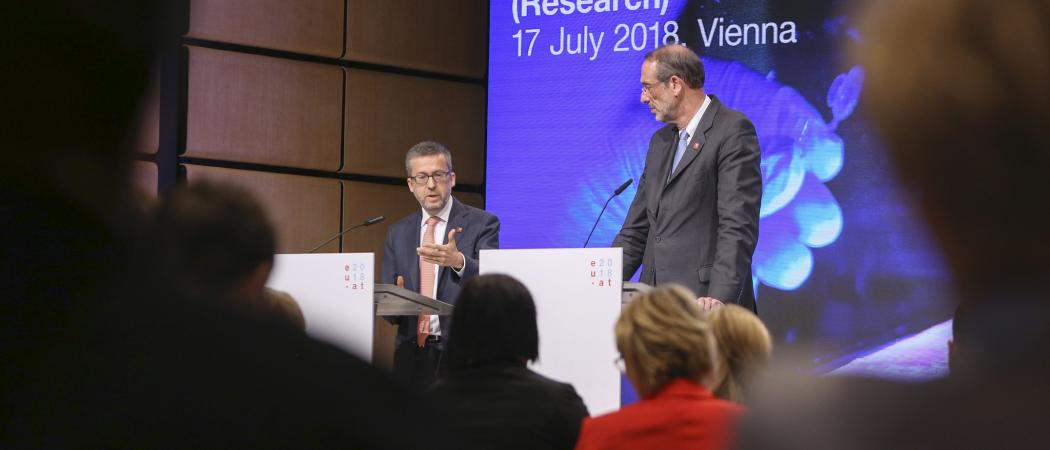Call for more rigorous detail in the proposal looks likely to frustrate the Commission’s push for accelerated approval of the €94B research programme

EU research commissioner Carlos Moedas in Vienna, at a meeting of EU research ministers. Photo: BKA/Martin Votava
Europe’s 28 research ministers may have thwarted European Commission hopes of fast tracking legislation for the next €94.1 billion EU research programme, Horizon Europe, making demands for a more detailed proposal and more control over planning.
“[We] requested to be more strongly included in planning the implementation of Horizon Europe,” ministers said in a joint statement after a meeting in Vienna, the chair of the EU’s rotating presidency, on Tuesday.
With European elections in May next year, the Commission has been pushing for accelerated agreement on Horizon Europe. But ministers said they first want to see more detail in the Commission’s proposal for the new European Innovation Council, which is being set up to provide funding for entrepreneurs and start-ups.
According to the conclusions of the meeting, “Assessments still differ with regard to how innovation funding should be designed in concrete terms in the future Framework Programme.”
Similarly, ministers said, “Too many questions still remain to be clarified with regard to the selection and implementation of missions”, another new feature in the 2021 - 2027 Horizon Europe programme. “The European Commission will clearly have to submit proposals regarding this topic,” ministers said.
There was also discussion among member states about giving more money to the Marie Skłodowska Curie fellowships for doctoral programmes.
Compared to past programmes, including the current Horizon 2020, the draft legislation for Horizon Europe is much shorter and more broadly worded, with relatively sparse details on exactly which topics and technologies will be supported, with how much money.
As a result, there is, “General uneasiness among members of the Parliament and member states about getting railroaded into agreement on what is a vaguer proposal when compared with Horizon 2020,” said Greg Arrowsmith, policy adviser to EUREC, the association of European Renewable Energy Research Centres.
The executive has proposed a “fast track” procedure to rush Horizon Europe through the normally lengthy EU legislative process and get a green light on the key elements from the European Parliament and Council before the May 2019 European elections.
But a half year negotiating window is uncommonly short in Brussels, and some critics of the process fear it will leave the Commission with too much power in determining the make-up of the programme.
“Who has more authority [and] decision making as to what goes into the programme? … It’s not all that insignificant,” said Austria’s Federal Minister for education, science and research, Heinz Fassmann, speaking after the meeting in Vienna.
Member states also want to ensure they can make changes to Horizon Europe in the future. That’s important because, in a programme not due to end for another decade, the odds of policy priorities changing are high.
“It’s hard to estimate what [will] be important in several years,” Fassmann said. “There should be some flexibility, and a strategic process for how we accept these topics later on.”
Searching for ‘least bad option’
It is possible to be either fast or rigorous on Horizon Europe legislation, but impossible to do both, said Kurt Deketelaere, secretary general of the League of European Research Universities. “My feeling, as a lawyer, is that I’d like to have more detail now. But the alternative of delaying the discussions until after the election could even be worse. So it’s like choosing the least bad option,” he said.
Jan Palmowski, secretary-general of the Guild, an association of 19 universities agreed. “Speed is important, but not as important as quality,”
Fassmann said there is some pressure to clear the legislation before a “period of uncertainty” next year. But he did not commit the Austrians to negotiate more than a first, rough plan of Horizon Europe before its presidency of the EU Council ends in December. “If we could get a [partial agreement] on the general part of the programme, then that would be a good thing. But it depends on preparedness of member states,” Fassman said.
If that is the extent of progress made under the Austrian Presidency, “No way is the trilogue done and dusted before the Parliament goes into elections,” Arrowsmith said.
Deketelaere agreed the schedule now appears “very optimistic”.
Bigger slice
Progress in negotiations on Horizon Europe hangs on how far talks advance on the shape of the €1 trillion overall seven-year EU budget.
Horizon Europe is vying for funding against the Common Agriculture Policy and the regional development programme at a time when the EU will lose the U.K.’s contribution to the budget.
At least eight of the 27 member states oppose a bigger EU budget, making the May 2019 target for reaching agreement difficult in the best of circumstances.
Austria, a net contributor, is insisting that the budget cannot grow at the same time as the UK leaves the EU.
Research ministers may want to protect the €94 billon allocated by the Commission to Horizon Europe, but ultimately the decision will be out of their hands.
“It’s nice research ministers are enthusiastic about a bigger EU budget,” said Deketelaere. “But my worry is, what do the finance ministers want?”





 A unique international forum for public research organisations and companies to connect their external engagement with strategic interests around their R&D system.
A unique international forum for public research organisations and companies to connect their external engagement with strategic interests around their R&D system.